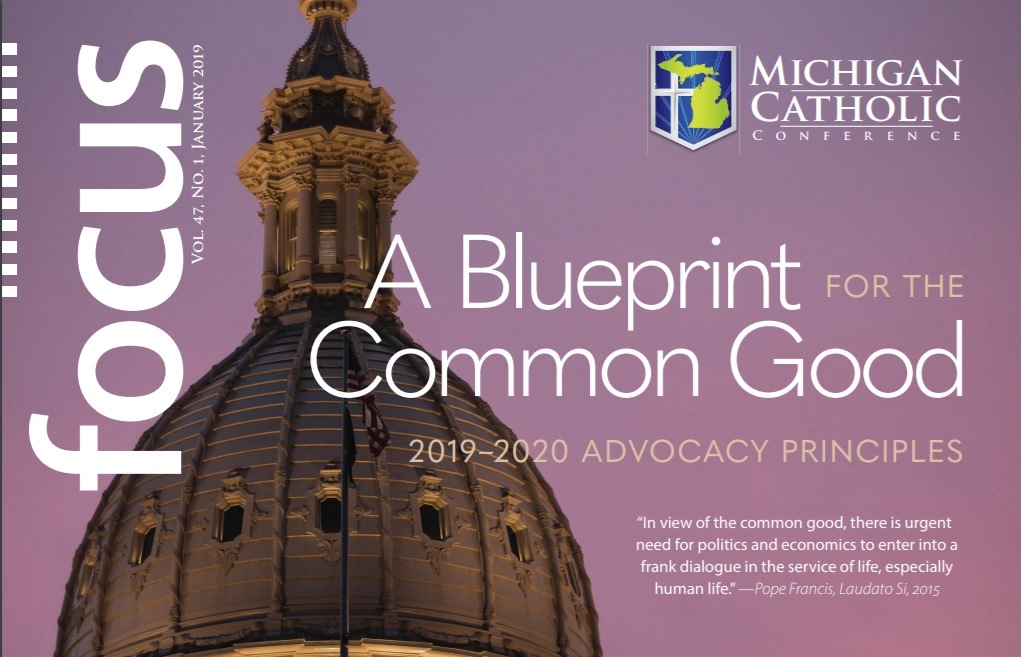For many Americans, politics has become synonymous with bitter partisanship and gridlock. As a result, it might seem confusing to hear the Church calling for Catholics to engage in politics. Pope Francis helps us understand, however, that politics can be “an essential means of building human community and institutions,” and an avenue that “respects and promotes fundamental human rights” (World Day of Peace Message 2019). Catholics have a role to play in bringing out the best in politics and rising above partisanship, for the benefit of those most in need.
The Michigan Catholic Conference (MCC) engages in the public policy process on behalf of the Church in this state, addressing legislation that impacts the value of every person. In the final hours of 2018, lawmakers adopted a pro-marriage, anti-poverty measure initiated and championed by MCC. Public Act 574 of 2018 assists low-income families in Michigan's Family Independence Program (FIP). Previous policy forced low-income couples with children to choose between marriage or economic stability for their family. The new law thus allows the Department of Health and Human Services to “disregard” temporarily a new spouse’s income for 18 months when determining a family’s FIP eligibility.
The end of the 2017-18 legislative session brought additional successes, including measures and funding to improve school safety and mental health outcomes for all students. Unfortunately, it also saw the gubernatorial veto of a bill that would have retained Michigan’s prohibition against webcam abortions. As a result of former Gov. Snyder’s veto, physicians are no longer required to be physically present with the patient before prescribing or dispensing abortion drugs. This is regrettable and does nothing to maintain a doctor-patient relationship.
It is important to note, however, that the public policy process does not begin or end in a single legislative session. Advocacy requires ongoing effort, especially as the calendar now turns to the 2019-20 session. In January, 38 members of the state Senate and 110 members of the state House of Representatives accepted their oath of office. Other top officials assumed their positions as well, including Secretary of State Jocelyn Benson, Attorney General Dana Nessel, Lieutenant Gov. Garlin Gilchrist, and Gov. Gretchen Whitmer. The new governor will announce her legislative priorities before a joint assembly of the Michigan Senate and House on Feb. 5, her first State of the State speech.
With these individuals seated in office, the MCC has delivered A Blueprint for the Common Good, its guiding principles for advocacy in the new session. Policies of interest are categorized into subjects, including human life and dignity, preferential option for the poor and regulatory policies, religious liberty, education, children and families, health care, restorative justice, immigration and refugees, and care for creation. A priority policy for staff is “Raise the Age” legislation, which would allow 17-year-olds to remain in the juvenile justice system, except in the most serious cases. Current law automatically treats these youth as adults — even for minor, non-violent offenses — which is misguided and ineffective. The MCC will also advocate for inclusion of critical programs for the vulnerable, including pregnant women and their children, in the upcoming state budget.
Through advocacy, the Michigan Catholic Conference seeks a better society, one that recognizes humanity’s shared responsibility for one another. Elected officials have a critical role in determining the direction of the state, but so do Michigan residents, including Catholics. As the Holy Father referenced in his Day of Peace message, “everyone can contribute his or her stone to help build the common home.” What perspectives can Michigan Catholics share to improve politics and society as a whole?
The MCC encourages all Catholics to participate in efforts that promote the common good. Together, people of faith can push for a different sort of politics in Michigan. This type of politics, heavily focused on defending human life and dignity, respecting one another, and promoting sound public policy, are part of a blueprint to a better state.
Paul A. Long is president and CEO of the Michigan Catholic Conference, the official public policy voice of the Catholic Church in this state. Join the Catholic Advocacy Network, an email system that provides updates on state legislative action and opportunities for advocacy, at www.micatholic.org/can/.










